
by Sarah Sensamaust | Jun 12, 2013 | Africa, Child Care, Childhood, Cultural Differences, Family, Home, Living Abroad, Motherhood, World Motherhood
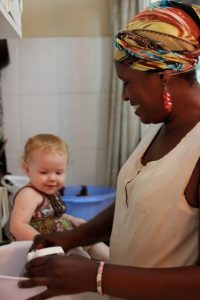
Look for Congo on any list ranking quality of life, poverty rate, violence per square meter, etc. and we don’t fare well. Great place to raise a kid, right?
Well, actually, for us, yes.
My friend Jill is my neighbor, co-worker and blogging partner on our blog Mama Congo. We raise our children, along with our husbands, in the Democratic Republic of Congo. What we lack in first world standards, we make up for in mamas. Our children call at least 6 women “mama.” Maybe more depending on the day.
In the Congo every woman is called “Mama So-and-So.” I’m Mama Sarah, she’s Mama Jill, and the women who come to our homes everyday and help us raise our children are Mama Youyou, Mamicho, Mama Vida and Mama Nounou. That’s a lot of mamas between our two households.
My husband Adam and I moved to the Congo five years ago and Jill and her husband Johan moved in next door a little while later. Our children all run around together getting bit by mosquitoes while we call for them to return to their respective houses. It’s a great life; made possible mostly by our mamas.
Jill and I are about to travel back to the States to visit our families for the summer. We’ll spend time with the grandparents, show off the new tricks our kids can do, and indulge in all the food we can’t find in Congo. But sometimes it’s hard to leave our little “village” of women raising our children with us.
Sure we’ll miss their help, but what we mostly miss is how totally fun and wacky and sometimes completely puzzling it is to raise your kids with a Congolese woman by your side. For example, sometimes we’ll find the mamas up in a tree throwing fruit down to our kids. They yell in French, “Look out below!” As star fruit or bunches of bananas rain down.
Every now and then from my office window I’ll see them toting our children on their backs when their little legs are too tired to walk home from the playground. Even the smallest baby cries, “Au dos. Au dos,” (on your back) when she wants to hitch a ride.
I know that if my daughter hasn’t eaten enough of her breakfast, I’ll get an earful when Mama Youyou shows up. She examines the size of her belly, determines it’s not properly filled, and then coaxes her into eating more. Next she reminds me I need to keep my kids nice and fat so that if they get sick they’ll be okay.
When the kids do inevitably get sick, the mamas are the biggest worriers. I get that. Where we’re from in the States, children get sick and then they get better. Here in Congo, that’s not a guarantee. So everyone hovers and shakes their heads and carries them au dos all day while rotating cold washcloths on their foreheads. It’s a major production. And the children love it.
Sometimes people ask us if it’s hard to share that title of “mama” with others. It isn’t. It really isn’t! We feel like the luckiest mamas because our children are being raised in such a different and loving way. Sure, it took some time for everyone to adjust and learn their place in the household, but we’ve all got into a rhythm now. I hold this end, you hold that end as we wrestle their filthy bodies in the tub.
I think every mother can agree that raising your children with a lot of help, mixed in with doses of advice, and sprinkled with good old fashioned judgment to keep you on your toes, is a great way to be a mama.
Do your children have other “mamas” where you live? Who are they, and how do they help you?
This is an original post written for World Moms Blog by Sarah. You can find Sarah blogging with Jill at Mama Congo.
Photo credit to the authors.
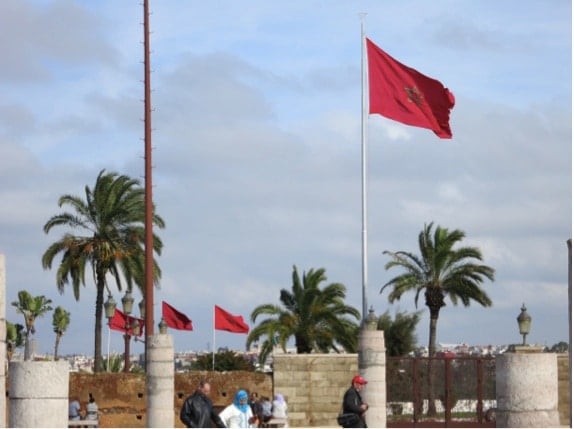
by Jennifer Prestholdt (USA) | Jun 11, 2013 | 2013, Human Rights, International, Morocco, World Moms Blog, World Voice

Photo by Jennifer Prestholdt
Hidden Child Labor
While millions of tourists visit Morocco every year, very few are aware of a hidden human rights abuse that is occurring behind closed doors in Morocco’s cities. Morocco has one of the worst child domestic labor problems in North Africa. The International Labour Organization (ILO) has estimated that between 66,000 and 88,000 children between the ages of 7 and 15 – 70% of whom are under age 12 – are working as domestic servants in Morocco.
These children work long hours for little pay and often suffer physical and other forms of abuse. Because domestic work is “women’s work” in Morocco, virtually all of these child domestic workers are girls. In Morocco (a country with a French colonial history), these child domestic workers are called petites bonnes or “little maids”.
I had the opportunity to learn more about the petites bonnes issue during a recent trip to Morocco. The United States Department of Labor’s Bureau of International Labor Affairs describes the problem like this:
Young girls are sent to work as live-in domestic servants, often before they reach age 10. Parents sell their daughters or receive payment of wages in exchange for their daughters’ service. These petites bonnes (little maids) often face conditions of involuntary servitude, including long hours without breaks; physical, verbal and sexual abuse; withheld wages and even restrictions on their movement. Frequently, they are sent from rural villages to more urban areas, and find it difficult to make their way home. Most petites bonnes are denied an education, and illiteracy rates are high among this population.
The Difficult Life of a Petite Bonne
The situation of petites bonnes in Morocco results from a combination of poverty, gender inequality, and lack of access to education. Girls – some as young as my own 8-year-old daughter – are sent to work as petites bonnes to generate income to support their families. They come from poor rural areas to work in cities such as Casablanca, Rabat, Marrakech, Tangiers, Agadir, and Fes. Intermediaries generally broker the arrangement, receiving a fee from the employer. Petites bonnes interviewed by Human Rights Watch reported that their employers frequently beat and verbally abused them, denied them the chance to go to school, and sometimes even refused to provide them with adequate food and sleeping facilities.
In a strange city, separated from their families and often speaking a Berber language instead of the Arabic spoken by a majority of Moroccans, many petites bonnes are extremely isolated and vulnerable. The isolation, along with the privacy of the homes, increases the chance of sexual abuse by male members of their employers’ household. In fact, several studies have found that many unwed young mothers in shelters in Morocco were petites bonnes when they became pregnant.
The difficult life of a petite bonne sometimes ends tragically. The widely reported story of little Khadija, an 11-year-old petite bonnewho was beaten to death by her employer in July 2011, raised calls for the government to take action on the issue. In January 2013, a 17 year old petite bonne in Casablanca attempted suicide by jumping from the fourth floor of her employers’ home. Amateur video of the suicide attempt that was circulated on the internet shocked Moroccans. Most recently, on March 24, 2013, a young domestic worker was taken to the hospital in Agadir with third degree burns on multiple parts of her body. Only 14 years old, she died from the injuries allegedly inflicted by her employers, prompting a UN representative in Morocco to decry child domestic labor by girls as “one of the worst forms of child exploitation” and call on the government to take action. Yet, thousands of petites bonnes in Morocco continue to suffer in silence.
Gaps in Legal Protection
According to NGOs working to help petites bonnes in Morocco, part of the problem relates to gaps in and difficulties with implementation of Moroccan laws. While Moroccan law prohibits employment of children under the age of 15, Morocco’s Labor Code does not apply to domestic work. Therefore, the Labor Codes’ protections for workers regarding hours worked (44 hours per week) and pay (2,333 dirhams or approximately $261 per month) do not apply. Human Rights Watch has documented that petites bonnes work long hours, often seven days a week. They earn an average of 545 dirhams (approximately $61) per month, but some earn as little as 100 dirhans (approximately $11).
In addition, Morocco ratified the Convention on the Rights of the Child (CRC) in 1993 and the ILO Convention No 182 on the Worst Forms of Child Labor. Both international treaties prohibit economic exploitation and employment of children in work that is likely to be hazardous, interfere with their education, or harm their health, safety or development. Unfortunately, neither have been implemented in a way that provides adequate protection to the petites bonnes.
Some Progress in Protecting Children
There is some indication that things are starting to change in Morocco. The government and international human rights organizations report that the number of girls working as petites bonnes is declining. This is due in part to the fact that public awareness about the problems faced by petites bonnes has been raised because of increased media attention to the issue and public education campaigns undertaken by the Moroccan government, NGOs, and United Nations agencies. The Moroccan government has also taken steps to increase school enrollment and this has helped reduce the number of children engaged in child labor.
Yet still more needs to be done. Since 2006, the government has been working on a draft law on domestic work that would for the first time establish a legal framework to better protect petites bonnes, secure rights such as a weekly day of rest and annual leave, and impose sanctions on employers. The Moroccan government has said that the draft Law on Domestic Workers is one of its priorities, but the bill has not yet been considered and passed by Parliament.
Take Action on June 12 – World Day Against Child Labour!
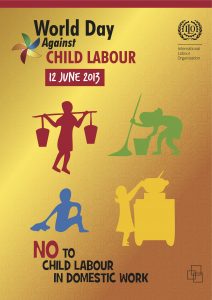 The problem of child domestic workers is not unique to Morocco. In fact, there are an estimated 15.5 million child domestic workers worldwide. The widespread use of children as domestic servants is one of the most hidden forms of child labor.
The problem of child domestic workers is not unique to Morocco. In fact, there are an estimated 15.5 million child domestic workers worldwide. The widespread use of children as domestic servants is one of the most hidden forms of child labor.
The exploitation of children, particularly girl domestic workers like petites bonnes, is a serious violation of children’s rights. It perpetuates inequality and inter-generational poverty, and deprives girls of their right to education, health, participation and protection. It also prevents children from acquiring the life skills and education necessary to improve their future.
To draw attention to the issue of child labor, the United Nations has recognized June 12 as the World Day Against Child Labour. In 2013, the focus is on child domestic workers like the petites bonnes of Morocco. On the 2013 World Day Against Child Labour, the international community is calling for legislative and policy reforms to ensure the elimination of child labor in domestic work and the provision of decent work conditions and appropriate protection to young workers in domestic work who have reached the legal working age. In Morocco, the government should:
• Strictly enforce the minimum age of 15 for all employment (including domestic work) and ensure that all children (particularly girls) enjoy the right to free and compulsory basic education;
• Adopt a domestic worker law that ensures compliance with the 2011 ILO Convention 189 on decent work for domestic workers
• Create an effective system for identifying, removing and rehabilitating child domestic workers from illegal or abusive employment.
• Criminally prosecute individuals responsible for violence or other criminal offenses against child domestic workers.
In addition, the World Day Against Child Labour provides the opportunity for all of us to take action to build the worldwide movement against child labor.
Take Action to end child labor. Learn what you can do to inform yourself and raise awareness in your community. The ILO’sSCREAM (Supporting Children’s Rights through Education, the Arts and Media) programme has factsheets, presentations, postcards, poems, and more. The SCREAM education pack is available in multiple languages.
Join the 12to12 to End Child Labour community. Learn more about the issue and join the 12to12 Community Portal, which provides a common platform for experience and knowledge sharing on research, activities and events related to the World Day Against Child Labour.
Find out what kids and teens can do to help. The ILO’s Youth in Action against Child Labour campaign has ideas, information, videos and other resources to help young people take action to end child labor.
Make a pinwheel with your kids. The pinwheel has become the symbol of the international fight against child labor. The pinwheel campaign to raise awareness about child labor began in Brazil in 2004. The five blades of the pinwheel represent the different continents of the world and the wind that makes the pinwheel spin is the will to act and to pass on the message until all countries take adequate measures to end child labor. Download a kit to make a pinwheel to keep the movement going!
This is an original World Moms Blog post written by Jennifer Prestholdt.
Were you aware of the international child labor issue? Does it exist in the country in which you live?

Jennifer Prestholdt is a lawyer and the Deputy Director of The Advocates for Human Rights, a volunteer-based human rights organization that works locally, nationally and internationally. Her work in human rights takes her around the world, but she spends most of her time in Minneapolis, MN, where she lives with her children (two sons and one daughter), her husband, an elderly cat and a dwarf hamster.
As Jennifer’s kids are now all in school (1st, 4th and 6th grades), she is finally finding more time to do the things that she used to love to do, especially running, writing and knitting. Jennifer loves to travel and has had the dubious distinction of having been accidentally locked in a bathroom on five continents so far. Australia and Antarctica await!
In January 2011, Jennifer made a New Year’s Resolution to start writing about her experiences in order to share with her children the lessons learned from 15 years of work in human rights. The result is her personal blog, The Human Rights Warrior. The name comes from her son Simon, who was extremely disappointed to learn that his mother is a lawyer, not a warrior.
You can find her on her blog The Human Rights Warrior or on Twitter @Jprestholdt.
More Posts
by Natalia Rankine-Galloway (Morocco) | May 29, 2013 | Childhood, Economy, Expat Life, Eye on Culture, Humanity, Morocco, Parenting, Poverty, Travel
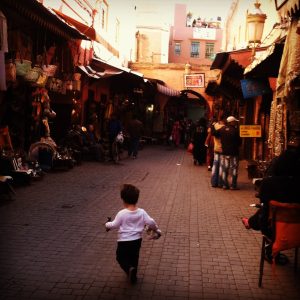 My mom loves to tell stories about her girls…to anyone who will listen. One of her favorites is about my first plane ride home from her native Peru. At age 6, as I sat in the window seat watching Lima fade away beneath us, I turned to her and said (with wisdom far beyond my years my mum will add) “the trouble with Peru is that the Peruvians don’t take good care of it.”
My mom loves to tell stories about her girls…to anyone who will listen. One of her favorites is about my first plane ride home from her native Peru. At age 6, as I sat in the window seat watching Lima fade away beneath us, I turned to her and said (with wisdom far beyond my years my mum will add) “the trouble with Peru is that the Peruvians don’t take good care of it.”
Admittedly it is one of her less embarrassing stories, better by far than the one that has me passing most of a Greek holiday with a potty on my head. And lately, as my son gets older, I’ve been thinking more about it.
By the time we leave Morocco this fall, he will not quite be three. Throughout our time here, that fact made me sad. There is likely little if anything that he will remember about our year in Morocco and our travels in North Africa. But now, this has also made me slightly grateful.
I have started to see the cogs turning in his little head when we pass the women begging on the street, with toddlers his age strapped to their backs. I see him watching the kids selling cartons of tissues at the stop lights as I guiltily roll up the window.
As his little eyes observe more and more I am starting to be glad that we will leave before the questions start. He hasn’t progressed much past the basic two-word toddler interrogatives: dada gone? more biscuit? But I am imagining the questions forming, and I need more time to come up with good answers.
When he asks me about these babies on their mothers backs, or the ones selling on streets, what do I say? Moreover, how do you explain your own role in the perpetuation of this inequality. How do I explain that being asked for the 19th time in one day to spare just 1 dirham irritates me more and more in spite of the fact that had I given one each time, I would now be short only $2? How would I explain that the shoes he’s wearing would cover our gardeners weekly salary?
Observant though I might have been at age 6 about the socio-economics of Peru, it did not give me any head start on figuring out any actionable recommendations for the Peruvians about how to improve their problems of poverty, inequality, pollution. Nor do I have any for Morocco now, some 25 years later.
I am a big believer in my own and my son’s capacity to save the world. I take part in fundraising campaigns, donate to charity and volunteer. I will always encourage him to live a life of tolerance, patience and understanding. But when you live in the midst of an unequal society – to what extent are you compromising your principles by continuing to live in the manner to which you are accustomed?
So while I doubt that I will ever come up with any Nobel Peace prize winning solutions to global income inequality myself, I would at the very least time to come up with a way of explaining poverty to my son. I would like to be able to explain to him that he is lucky without teaching him conceit or entitlement. I would like to teach him that our relative wealth comes with a responsibility to those less fortunate in such a way that empowers and doesn’t leave me stinking of rank hypocrisy when I look away from the outstretched hands on the street.
How do you teach your children about income inequality when you are living on the “have” side of an unequal society?
This is an original post to World Moms Blog by our contributor, Natalia Rankine-Galloway, who writes at The Culture Mum Chronicles. She is now writing from the U.S. Embassy in Morocco.
Photo credit to the author.

Natalia was born a stone's throw from the Queen's racetrack in Ascot, UK and has been trying to get a ticket to the races and a fabulous hat to go with it ever since. She was born to a Peruvian mother and an Irish father who kept her on her toes, moving her to Spain, Ireland and back to the UK before settling her in New York for the length of middle and high school. She is still uncertain of what she did to deserve that.
She fled to Boston for college and then Washington, D.C. to marry her wonderful husband, who she met in her freshman year at college. As a military man, he was able to keep her in the migratory lifestyle to which she had become accustomed. Within 5 months of marriage, they were off to Japan where they stayed for a wonderful 2 and one half years before coming home to roost. Baby Xavier was born in New York in 2011 and has not slept since.
A joy and an inspiration, it was Xavier who moved Natalia to entrepreneurship and the launch of CultureBaby. She has loved forging her own path and is excited for the next step for her family and CultureBaby.
Natalia believes in the potential for peace that all children carry within them and the importance of raising them as global citizens. She loves language, history, art and culture as well as Vietnamese Pho, Argentinian Malbec, English winters, Spanish summers and Japanese department stores...and she still hopes one day to catch the number 9 race with Queen Liz.
You can find her personal blog, The Culture Mum Chronicles.
More Posts

by Jennifer Burden | May 28, 2013 | Shot@Life, Social Good, Uganda, World Voice
Jennifer Burden traveled by invitation of the UN Foundation’s Shot@Life campaign to Uganda to observe UNICEF’s Family and Child Health Days, where children are provided life-saving vaccinations. This post reflects on Day 3 of her adventure in October. She has previously reported on day 1 about UNICEF offices in Kampala, Uganda and day 2 of her trip at a UNICEF Family Health Day in Mumbende, Uganda.
Riverboat Safari
On Day 3 of our Ugandan adventure we took a detour. We were scheduled to meet with the health staff who were going to be working at the Family Health Days that we were visiting on Sunday, but they were still busy preparing for Sunday. So, we found ourselves with unexpected free time. What better thing to do in Africa when your plans fall through than to visit one of Uganda’s national parks?
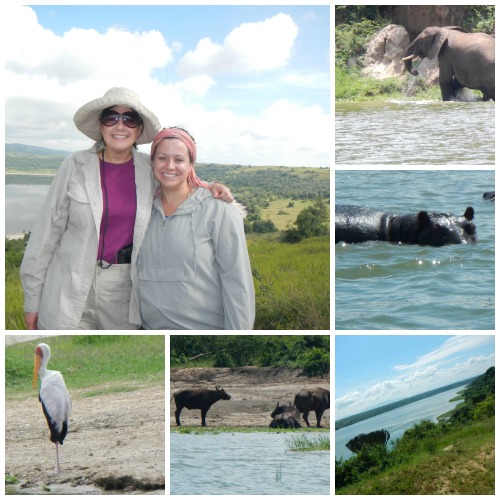
Queen Elizabeth National Park in Uganda. Jennifer Burden of World Moms Blog with Jenny Eckton of the blog, Formerly Phread while in Uganda in October 2012 with Shot@Life.
Saturday’s adventure led us to Queen Elizabeth National Park, where we went on a river safari cruise on Lake Edward. We saw a multitude of hippos and buffalo, as well as, elephants, crocodiles, monkeys and beautiful birds. We hopped a riverboat and spent the entire time out on the water. I have never seen so many hippos in my life. Apparently, some had been brought to the park in the 1960s, and they’ve been expanding every since! One moment the waters would appear empty, but the next many hippo heads popping up out of the water! Babies followed their moms. They swam around together in groups. Absolutely incredible!
Culture & Signs of Extreme Poverty
The excursion was a fantastic opportunity for our delegation to get a feel of the country’s natural beauty and a great team building exercise. We were bonded going into the next Family Health Day. However, driving through the extreme poverty on the long bus ride through the country really put into perspective how much UNICEF’s efforts were needed.
We saw homes made of only big sticks and mud with reeds or tin for roofs. Although they are great “green” homes for the country’s beautiful African sun drenched days, they are unsuitable when temperatures become very cold at night and there is no running water or electricity.
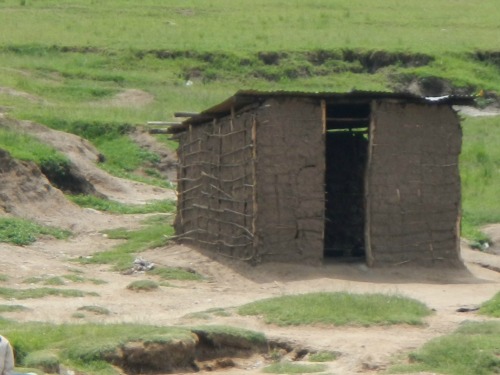
Ugandan house made of mud and sticks.
Also, children were seen walking long distances in school uniforms, many alone. Women, men and children carried large yellow containers to collect water in and walked for miles home. An image that will never cease to amaze me — the site of an African woman balancing her load on her head and walking on the roadside barefoot.
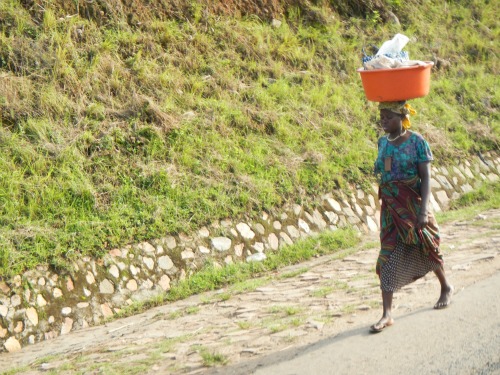
Woman in Uganda walking on side of road in western Uganda.
Unfinished homes and store fronts were quite common. We were told that owners would save up for bricks and then add gradually to the structure over many years. It was not uncommon to see unfinished storefronts in use or piles of bricks that had been delivered to unfinished residences. Bricks were made of heated, dried mud.
Here is an example of a typical storefront. This one is a bicycle shop and a clothing store. Often times, the storefronts were painted by companies seeking to advertise mobile phones and other products.
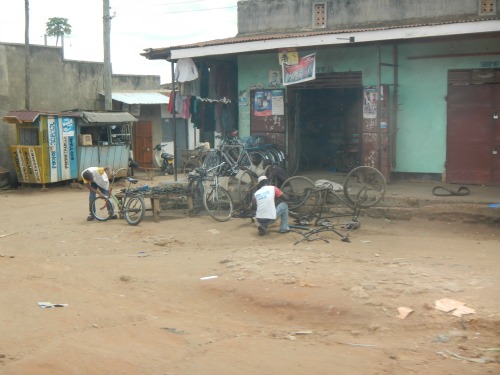
Common roadside storefront in Uganda.
We were truly humbled by our trip out to western Uganda. The further we drove away from Kampala, the more common it was to see mud huts. And storefronts were everywhere, often with mothers manning them and children playing outside. Day 3 was a truly memorable day. We captured photos that changed us and that will stay in our advocacy hearts forever. This day was good for our delegation to get to know each other better and prepare for the next round of Family Health Days on Day 4.
This is an original post to World Moms Blog by founder, Jennifer Burden of New Jersey, USA.
Photo credits to the author.

Jennifer Burden is the Founder and CEO of World Moms Network, an award winning website on global motherhood, culture, human rights and social good. World Moms Network writes from over 30 countries, has over 70 contributors and was listed by Forbes as one of the “Best 100 Websites for Women”, named a “must read” by The New York Times, and was recommended by The Times of India.
She was also invited to Uganda to view UNICEF’s family health programs with Shot@Life and was previously named a “Global Influencer Fellow” and “Social Media Fellow” by the UN Foundation. Jennifer was invited to the White House twice, including as a nominated "Changemaker" for the State of the World Women Summit. She also participated in the One Campaign’s first AYA Summit on the topic of women and girl empowerment and organized and spoke on an international panel at the World Bank in Washington, DC on the importance of a universal education for all girls. Her writing has been featured by Baby Center, Huffington Post, ONE.org, the UN Foundation’s Shot@Life, and The Gates Foundation’s “Impatient Optimists.” She is currently a candidate in Columbia University's School of International and Public Affairs in the Executive Masters of Public Affairs program, where she hopes to further her study of global policies affecting women and girls.
Jennifer can be found on Twitter @JenniferBurden.
More Posts - Website
Follow Me:


by Jennifer Burden | May 26, 2013 | Maternal Health, Uganda, Uncategorized, World Moms Blog
A few weeks ago I had the opportunity to write on maternal health for The Bill & Melinda Gates Foundation’s amazing blog, Impatient Optimists. The foundation is “guided by the belief that every life has equal value, the Bill & Melinda Gates Foundation works to help all people lead healthy, productive lives.” I chose a story out of Uganda from when I visited there with a delegation from the UN Foundation’s Shot@Life campaign. I described my meeting with a nurse midwife from one of UNICEF’s Family Health Days in Fort Portal, Uganda.
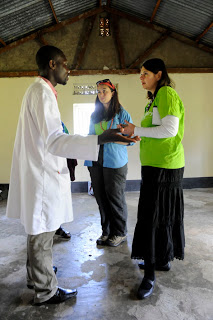
Jennifer Burden of World Moms Blog and Cindy Levin of RESULTS talk to a lab technician in Fort Portal, Uganda, while there with a delegation from the Shot@Life campaign. Photo credit to Stephanie Geddes.
World Moms, you must go over there and check out what I learned about prenatal care from the trip and the instruments used for pregnant mothers. And you won’t believe how many checkups the nurse midwife is hoping that her patients attend and what percentage actually do. And why babies who have an HIV positive mom and who are not HIV positive must stop breastfeeding at 1-year old. Ok, enough here. The answers are all over at my post at The Bill & Melinda Gates Foundation, “What I Learned from a Midwife in Uganda“. Go there, and check out their site!
Comments here are closed. Go on over there to comment!

Jennifer Burden is the Founder and CEO of World Moms Network, an award winning website on global motherhood, culture, human rights and social good. World Moms Network writes from over 30 countries, has over 70 contributors and was listed by Forbes as one of the “Best 100 Websites for Women”, named a “must read” by The New York Times, and was recommended by The Times of India.
She was also invited to Uganda to view UNICEF’s family health programs with Shot@Life and was previously named a “Global Influencer Fellow” and “Social Media Fellow” by the UN Foundation. Jennifer was invited to the White House twice, including as a nominated "Changemaker" for the State of the World Women Summit. She also participated in the One Campaign’s first AYA Summit on the topic of women and girl empowerment and organized and spoke on an international panel at the World Bank in Washington, DC on the importance of a universal education for all girls. Her writing has been featured by Baby Center, Huffington Post, ONE.org, the UN Foundation’s Shot@Life, and The Gates Foundation’s “Impatient Optimists.” She is currently a candidate in Columbia University's School of International and Public Affairs in the Executive Masters of Public Affairs program, where she hopes to further her study of global policies affecting women and girls.
Jennifer can be found on Twitter @JenniferBurden.
More Posts - Website
Follow Me:


by Mannahattamamma (UAE) | May 22, 2013 | Body Image, Cultural Differences, Feminism, Human Rights, Religion, SAHM, Sex, Tunisia, UAE, Womanhood, Women's Rights, World Events, World Voice
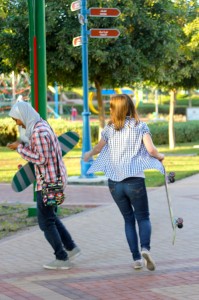 I used to have a college professor—of women’s studies, of course—who would occasionally start class when we were particularly chatty and inattentive by saying, loudly, “SEX!” Our heads would whip around to stare at her and the room would be silent.
I used to have a college professor—of women’s studies, of course—who would occasionally start class when we were particularly chatty and inattentive by saying, loudly, “SEX!” Our heads would whip around to stare at her and the room would be silent.
The professor would chuckle and then start the lesson, which almost never had anything to do with sex—or at least not sex in an interesting way. Her way of talking about sex was dry and academic, having to do with words like “hegemony” or “heteronormative.”
I thought about that professor a few weeks ago when I read about “International Topless Jihad Day,” sponsored by FEMEN in support of Amina Tyler, who had sparked a global controversy by posting a topless pictures of herself on Facebook with “my body belongs to me and is not the source of anyone’s honor,” scrawled on her naked chest in Arabic. Tyler’s life—and the lives of her family—were threatened after the pictures were posted; she has since left Tunisia, where she lived.
The topless jihadists claimed that their actions showed solidarity with Amina and sent a message to the world that women’s bodies belong to no one but themselves. And yet it seems a bit like my professor yelling SEX! FEMEN is yelling BOOBS–and the topless jihad did, it’s true, get a lot of press coverage. The coverage drew attention to Amina’s plight but also gave respected media outlets a chance to run pictures of boobs and more boobs: Huffington Post ran a whole slideshow of revolutionary boobs. (more…)
After twenty-plus years in Manhattan, Deborah Quinn and her family moved to Abu Dhabi (in the United Arab Emirates), where she spends a great deal of time driving her sons back and forth to soccer practice. She writes about travel, politics, feminism, education, and the absurdities of living in a place where temperatures regularly go above 110F.
Deborah can also be found on her blog, Mannahattamamma.
More Posts
Follow Me:





















